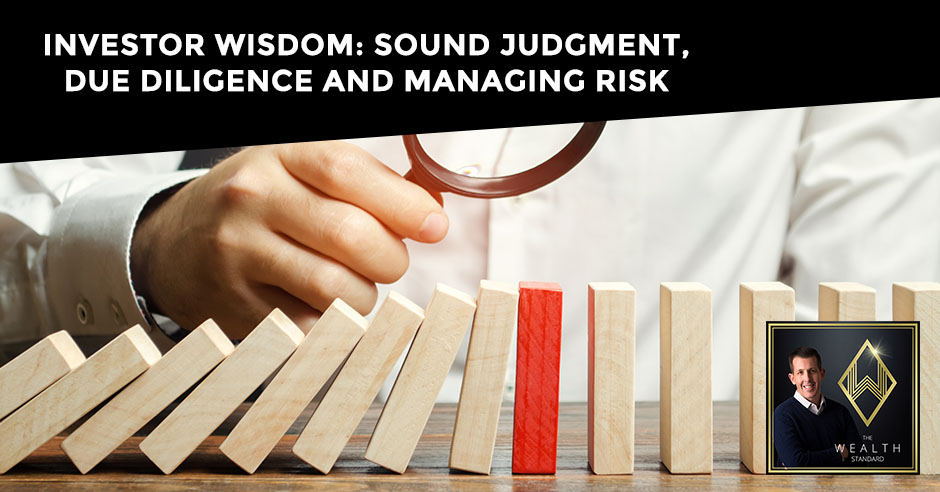Investor Wisdom: Sound Judgment, Due Diligence And Managing Risk
Podcast: Play in new window | Download

The road to financial freedom is difficult and fraught with risk. Reaching financial independence means managing risk. In this episode, Patrick Donohoe talks about risk management, investor wisdom and due diligence. He shares an experience with a bad investment and what he learned from it. Tune in to learn more about what you need to keep in mind when investing.
—
Watch the episode here:
Listen to the podcast here:
Investor Wisdom: Sound Judgment, Due Diligence And Managing Risk
This episode is sponsored by the new and improved Financial Independence Calculator found at TheWealthStandard.com/calculator. One of the driving forces of human beings is freedom, which infers financial freedom too. Several years ago, I set out to discover how any individual, regardless of their financial situation, could evaluate their finances in five minutes or less and have a firm date when they could achieve financial independence. The calculator is going to take you just a few minutes to complete and it’s going to provide you with a specific financial independence date. Go check it out now.
—
“Life is a series of sensory experiences, then you die.” This statement sunk in at a pretty deep level. Time sneaks up on us. Our survival instincts make us believe that we’re going to live forever. We get those momentary glimpses of our child’s faces, who are now more adult than they are kids. It’s conversations with family members that are in their fourth quarter of life or you hit marital milestones that are calculated in decades instead of years. We can’t get our time back and exchange it for the meaningful experiences we want that were most likely taken up by the mundane work or wasteful, meaningless activities.
You may not consciously link the fleetingness of time to wealth-building and investing, but I want you to consider the possibility that there is almost a direct correlation. In my experience personally and with clients, urgency will breed complacency and impulsiveness when it comes to making financial decisions. This urgency comes from the unconscious realization that you may not have enough money to retire or be financially free. In order to have more money, you must invest and investment requires risk. This urgency is, in my opinion, amplified by the unfathomable amount of information and perspective we are constantly bombarded with, which further limits our capacity to think critically.
We’re all in this tractor beam of stimuli and without awareness and discipline, we have little control over filtering what is constantly fighting for our attention. I saw this report by Statista, a data analytics company, about what happens on the internet in just one minute. It blew my mind. Look at some of these statistics. Two hundred million emails, 69 million messages on Facebook and WhatsApp, 2 million Tinder swipes, 5,000 hours of YouTube videos are uploaded, 695,000 people share a story on Instagram and 9,132 new connections are made on LinkedIn. There’s more. It’s crazy. How do you step out of this tractor beam to make wise financial decisions? I’m going to tell you a personal story to illustrate this.
Without awareness and discipline, we have little control over filtering what is constantly fighting for our attention. Share on XIn 2006, I was introduced to an investment opportunity in a new oil and gas company. The principals had worked at one of the largest oil companies globally. They were stationed all around the world in the Middle East and parts of Texas and Oklahoma. They stepped down to form their own company and were raising money to acquire these unproductive, inefficient oil and gas operations in Texas. I ended up investing almost everything I had initially. I was very compelled by these guys, but I didn’t understand successful business operations, let alone an oil and gas company. I didn’t know even what the word assay meant. I couldn’t begin to understand what an assay report was, the legalities of mineral rights, contract law or the fact that the investment I was putting money into was debt and not tied to any underlying asset, but I invested anyway.
Leading up to the craziness in 2008, I was getting cashflow every month. I felt like this was a wise investment and I was a good investor. I decided to invest even more. I borrowed money to do it. This was when cashflow stopped. It was devastating. I won’t go into that. I tell the story in the book. After the initial emotional meltdown from 2008 to 2011, I went on this witch-hunt to figure out what happened. I learned a ton about business operations and the cost of lousy operations. An example is the discovery of this oil field operator coincidentally having ownership in a trucking company that was transporting the oil. Apparently, they thought it was okay to charge five times the going rate to this specific operation.
I also learned from the assay and financial reports that the interest that was being charged on these promissory notes would inevitably result in ongoing negative cashflow. There were a dozen other discoveries. I’m not going to get into it, but I’m going to segue into the lessons and apply them to your investment experience. First, one of the biggest skills of an investor is knowing how to think critically, which to me is an inhibitor to impulsive response and irrational behavior when it comes to making financial decisions. Why? All investments originate from a hypothesis perspective. The hypothesis is simply an interpretation by an inherently fallible person who won’t tell you that they’re fallible to highlight all the things they’re good at.
The lesson is to evaluate the team that will execute the investment, “Are they green?” If you don’t understand business fundamentals or the industry that you’re investing in at an operational level, at least stay out. You don’t have business there. It’s a huge risk. The principals in this specific investment, I trusted them and that’s why I invested for obvious reasons. They were successful specialists in their respective careers, but they didn’t possess the adequate business acumen to make the investment successful on a business scale. If they did, there were so many red flags that I was able to find as a neophyte that they would have found out if they knew how to do proper due diligence.

Managing Risk: We can’t get our time back and exchange it for the meaningful experiences we want that were most likely taken up by the mundane work or wasteful, meaningless activities.
I would also say that private investments like this one don’t have the level of regulation that a publicly traded investment has. That’s why there’s a greater upside, but also it carries a huge amount of risk because of the downside. There’s still risk in publicly traded investments, but what minimizes that risk is the regulatory criteria that come with severe consequences if it’s not met. There’s a high degree of built-in accountability with publicly traded investments. In order for someone to be successful in that arena, they have to consistently meet these criteria. It includes accounting, legal, business operations, executive levels, managers and hiring, which adds to the expense. That is why dividend returns on publicly traded companies in the oil and gas industry like Exxon or Schlumberger are typically always in the single digits.
The next lesson is to know your asset allocation based on risk and control. That was another error where I invested way more than I should have given the amount of money I had at that time. This is one of the reasons I came up with the Hierarchy of Wealth. I wrote about this extensively in Heads I Win, Tails You Lose, which is the book I came out with that tells you more about the theory behind it. The Hierarchy of Wealth has four tiers. It will help you easily look at your asset allocation so that you know the appropriate amount to invest in these higher-risk assets.
What do you do with the lesson? First, we have a free calculator for The Hierarchy of Wealth. You can put your assets into it easily. The idea behind The Hierarchy of Wealth is to go in a sequence of priorities. You build your tier-one capital, which is your foundational capital. Your reserves and sleep well at night account. You do this before investing in anything else. Next, instead of investing outside of you, you invest in yourself. You figure out how to earn more money by being more valuable in the marketplace. As you go through this hierarchy, you invest in more safe assets that have good returns, individual rental properties that have at least 20% equity and a 0.8% rent-to-value ratio. I talked about that in the book as well.
When you get to that point, invest in what you understand. My brother came to me and was a great example. He was through his Hierarchy of Wealth and ready to invest maybe with more risk to get the better upside. We had a conversation about his expertise which is mergers and acquisitions, especially in the healthcare industry. He knew it forwards and backward. Understanding the financials, business plan and team involved, he would be able to go in and do due diligence on a very high level. It’s investing in those areas and companies. It could be a REIT in the healthcare space, Real Estate Investment Trust. It’s something that he was familiar with that he can take his knowledge and expertise and do the proper due diligence to figure out if it’s the best place to put his money that will mitigate risks.
If you don't understand business fundamentals or the industry that you're investing in at an operational level, at least stay out. Share on XThere are other examples I have in the book of being able to invest in areas that you understand. The book you can get for free on the website in PDF format. Go to Resources and the book link should be there. The next thing to do is sharing is caring. Share this information and teach somebody else what you guys learned. It’s one of the best ways to lock in the understanding so that the next time you are faced with financial decisions, specifically in the arena of making an investment, you will remember this experience. Chances are, if you don’t teach somebody in 2 or 3 weeks, the information will be gone.
Let’s summarize this episode. First, all investment is a hypothesis by people. Therefore, it inherently is susceptible to flaw and fallibility that requires due diligence. Learn to judge your judgments when investing because you instinctually will make a judgment unconsciously and look straight to the rate of return and the opportunity to build wealth. You also associate decisions with the character and charisma of the person in charge. Make a judgment about their level of competency without going beneath the surface, which is that big lesson that I learned. It was a hard and painful lesson and one that I hope you don’t have to experience.
Finally, another thing you guys can do is there’s a live demo that I’m doing with the Financial Independence Calculator as well as The Hierarchy of Wealth. This is going to happen in 2021 on September 10th. If you already have the Financial Independence Calculator and the Hierarchy of Wealth Calculator, then you will receive an email. If you don’t have it, you can go to TheWealthStandard.com/calculator. There you will be given the opportunity to register for this live demo that I’m going to do. I’m not sure of the time yet, but it will most likely be in the afternoon. Thank you for reading. I appreciate the support. I hope you learned something and stick with me for the coming episodes. You’re not going to want to miss them. Until then, take care.
Important Links:
- TheWealthStandard.com/calculator
- Report – A Minute on the Internet in 2021
- Hierarchy of Wealth
- Heads I Win, Tails You Lose
Love the show? Subscribe, rate, review, and share!
















